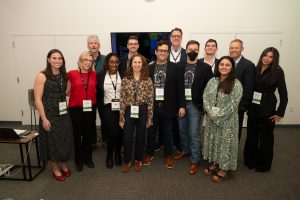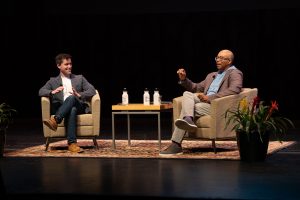FFAR Awards $800,000 Grant to Startup Company Using Facial Recognition and Robotics to Revolutionize Vaccination for Chicks

Applied Life Sciences & Systems researchers are developing a vaccination system with potential to improve bird health and productivity and reduce need for antibiotics
WASHINGTON, Nov. 7, 2017- The Foundation for Food and Agriculture Research (FFAR), a nonprofit established in the 2014 Farm Bill with bipartisan congressional support, awarded an $800,000 Seeding Solutions grant to Applied LifeSciences & Systems (ALS-S), a startup company that is using imaging and robotics technology to develop a device for vaccination of newly hatched chickens, or chicks. This device is designed to provide an efficient system for high throughput vaccination potentially enhancing bird health, increasing productivity for poultry producers, and reducing the need for antibiotics. The FFAR grant has been matched with funding from Merck Animal Health for a total $1.6 million investment.
Large commercial hatcheries, which currently produce more than 1 million chicks per week in the United States, apply vaccines in spray form to groups of day-old chicks. The limited precision of this method results in an estimated 5-20 percent of chicks left unvaccinated or partially vaccinated and vulnerable to disease. Disease outbreaks require use of antibiotics to treat secondary infections and reduce overall productivity.
ALS-S researchers are developing a vaccine delivery system that uses imaging technology to recognize each bird’s position and deliver an individualized vaccine dose to each chick. By significantly increasing the rate of successfully vaccinated chicks, this method has potential to provide greater protection against disease and infection.
Currently, the only way to apply vaccines to chicks at the individual level is to do so manually, which is not viable at the commercial scale.
“The Foundation for Food and Agriculture Research is proud to support a project with such exciting potential to enhance productivity for poultry producers by improving vaccine effectiveness and make strides toward combating antimicrobial resistance by reducing the need for antibiotics,” said Sally Rockey, Executive Director of the Foundation for Food and Agriculture Research. “Using facial recognition and robotics technology to deliver vaccinations with greater precision is a prime example of harnessing innovations developed outside the agriculture sector for the health and productivity of our food system.”
Initial research will focus on preventing coccidiosis, an intestinal disease causing a variety of issues including poor feed efficiency, and often resulting in the need for antibiotic treatment of subsequent infection. Coccidiosis is the most prevalent disease in U.S. broiler poultry production and is estimated to cause hundreds of millions of dollars in economic losses.
The research is being led by Principal Investigator Elizabeth Turpin, Ph.D., Vice President, Bio Process Sciences at ALS-S.
“ALS-S is working to address the unmet needs of the poultry industry, starting with the development of a system to improve the vaccination of day-of-hatch chicks,” said Turpin. “We are excited to receive this award from FFAR with matching funds from Merck Animal Health. This support will aid in the development and validation of our high throughput, individual vaccination system and ultimately result in improved solutions for the poultry industry.”
This project is supported by FFAR through its Seeding Solutions grant program, which calls for bold, innovative, and potentially transformative research proposals in the Foundation’s seven Challenge Areas. This grant supports the Protein Challenge, which aims to enhance and improve the environmental, economic, and social sustainability of producing diverse proteins for a growing global population.
About the Foundation for Food and Agriculture Research
The Foundation for Food and Agriculture Research, a 501 (c) (3) nonprofit organization established by bipartisan Congressional support in the 2014 Farm Bill, builds unique partnerships to support innovative and actionable science addressing today’s food and agriculture challenges. FFAR leverages public and private resources to increase the scientific and technological research, innovation, and partnerships critical to enhancing sustainable production of nutritious food for a growing global population. The FFAR Board of Directors is chaired by Mississippi State University President Mark Keenum, Ph.D., and includes ex officio representation from the U.S. Department of Agriculture and National Science Foundation. Learn more: www.foundationfar.org Connect: @FoundationFAR
About Applied LifeSciences & Systems
Applied LifeSciences & Systems (ALS-S) is an animal health bio-systems company focused on developing innovative solutions for the animal health industry to improve animal health and productivity. ALS-S was formed in Raleigh, NC in 2015 through an alignment of animal health industry and medical device veterans whom have previously worked together successfully developing, commercializing and scaling bio-systems businesses. The ALS-S management team and advisory board together have over 280 years of experience in the animal health industry. Learn more: www.als-s.com



